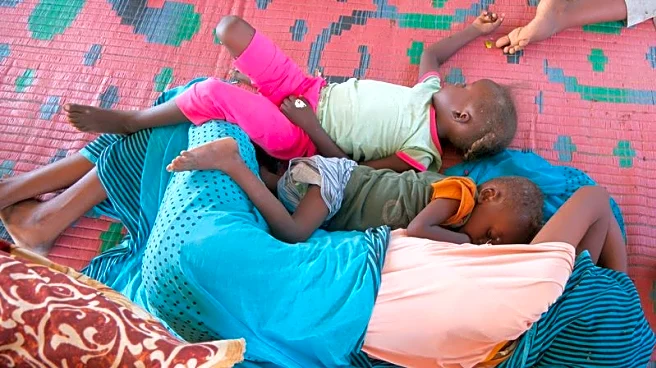By Nafisa Eltahir
AL-DABBA, Sudan (Reuters) -As the siege by Sudan's Rapid Support Forces tightens around al-Fashir, the few able to pay to escape describe living under constant shelling and negotiating
violence at checkpoints to get out of a city where people have resorted to eating animal feed.
Last week, a U.N. fact-finding mission found that the RSF had committed crimes against humanity in al-Fashir, the final holdout of the Sudanese army in the Darfur region of western Sudan.
"Hearing about this is nothing compared to living it," said one escapee, Dar al-Salam Hamed. When she and her family finally decided to leave, she said they were searched aggressively by RSF soldiers and robbed on the road.
"We truly wish to never meet these people ever again," she told Reuters at a camp in al-Dabba, an area under army control.
The RSF did not respond to requests for comment.
Two-and-a-half years of war between the paramilitary RSF and the army has created what the United Nations calls the world's worst humanitarian crisis in Sudan, with widening pockets of famine across the country including in al-Fashir, the capital of North Darfur state.
The city has become a main frontline of the war as the RSF seeks to solidify its hold on Darfur as the base for a parallel government. The leaders of that government were sworn in last month and on Monday they began appointing ministers.
Almost half a million have fled al-Fashir since the fighting there began in May 2024 and 270,000 remain, according to U.N. estimates.
MASS DEATHS
Ahmed Haj Ali and his family left the city last week, arriving just days ago at al-Dabba, where a Reuters reporter spoke to more than a dozen people who had fled.
"The situation is disastrous, there's shelling 24 hours a day from all directions," he said, describing people dying by the dozens and hospitals packed with injured people but with no stocks of gauze to stop their bleeding.
The army and its allied Joint Forces have maintained control of al-Fashir, and though the RSF advanced close to the military headquarters last week, in recent days the army has carried out a drone campaign that has pushed them back.
The Joint Forces are largely made up of non-Arab tribes long in rivalry with the Arab tribes that make up the core of the RSF, leading to ethnically-based attacks, including during the capture of the vast Zamzam displacement camp in April.
Recently, the RSF widened the 31 kilometres (19 miles) of berms surrounding much of the city, making it even harder for civilians to leave and forcing smugglers to carry food supplies on foot, said one resident who asked to stay anonymous for protection.
As a result, a bowl of the staple grain, millet -- which would provide one meal for 3-5 people -- has risen to more than $35, and a pound (450g) of sugar to almost $20. Ambaz, a form of animal feed most people have resorted to, has seen its price rise six-fold and become scarce, residents say.
A senior army source said the army had launched a major air and ground offensive in neighbouring North Kordofan state on Sunday to break the siege on al-Fashir as well as the cities of al-Dalanj and Kadugli to the south.
STARVATION, SEXUAL ASSAULTS
The U.N. fact-finding mission found that in al-Fashir the RSF "committed the war crime of intentionally using starvation as a method of warfare" and that the deprivation of access to food, destruction of hospitals, and obstruction of humanitarian assistance "may also amount to the crime against humanity of extermination."
In a statement last week, U.N. Women said that rape and sexual assaults had been used as a weapon of war in North Darfur.
"Pregnant women are giving birth into the hands of unskilled attendants with no access to emergency obstetric care," it said.
Escapee Ali said he and his brother were beaten at a checkpoint when they left al-Fashir at dawn "due to the conditions ... the shelling, the humiliation, and many other things".
Leaving has become not only dangerous but expensive, costing him 5 million Sudanese pounds (about $1,600), he said, and few people have any money at all. Members of the RSF have turned evacuations, like smuggling, into a side business.
"That's why people are forced to stay there," he said. "We left them behind."
(Writing by Nafisa Eltahir; Editing by Aidan Lewis)









